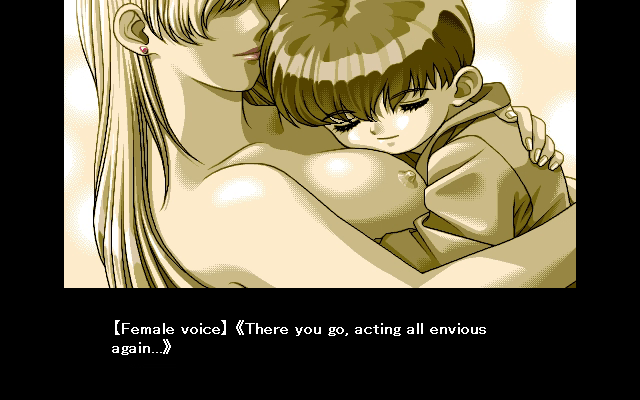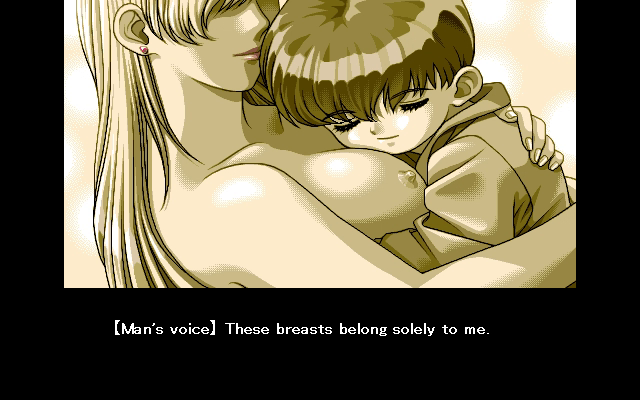The Oedipal Pattern

At the start of a new game, YU-NO shows a vision of Takuya’s biological mother, Kaytia (or Keiko), holding her baby son between her bare breasts. The imagery suggests maternity. But Takuya’s father, Koudai, berates his son—a crying child—for not being enough of a man. Kaytia remarks that Koudai is “envious” of Takuya, to which Koudai replies,

Suddenly, the image of the baby against his mother’s chest is sexualized. Afterward, while wistful music plays, Takuya awakens on the school roof, having dreamed about his biological mother’s breasts. He reflects how long ago she died and says:
“[My old man is] even pervading my dreams now. These past couple of days, they’ve been especially bountiful. And by ‘bountiful,’ I mean the number of dreams I’ve had, not the frequency I’ve done you-know-what, nor the volume I produced. […] Dreams are the embodiment of repressed desires. Those words were said by some big shot doctor somewhere. ‘Repressed desires,’ huh… or maybe it’s a feeling of regret with respect to my parent’s [Koudai’s] expectations?”
With this narration, Takuya juxtaposes and links his mother’s breasts, masturbation, “repressed desires,” and an allusion to Freud, that “big shot doctor somewhere.” There are clear Oedipal implications. As the tone-setting opening scene conveys the first information the player learns about Takuya, this moment holds particular significance. Later, Koudai explicitly calls out Takuya’s “Oedipus complex.” Other characters identify Takuya as the “walking libido.” Kanno invites a Freudian reading or at least a reading that uses Freudian terminology. In The Interpretation of Dreams, Freud claimed, as Takuya recalls with his remark about “repressed desires,” that dreams can contain a fulfillment of forbidden wishes (229–230) and “a recollection from the dreamer’s earliest childhood” (298). Takuya’s pivotal dream of Kaytia fits entirely into this framework.
The most significant topic for YU-NO is perhaps the most famous of Freud’s psychoanalytical concepts, the Oedipus complex. I am no Freudian. So to draw on the explanation SimplyPsychology provides, Freud believed that children discover sex differences in early childhood. At this stage of psychosexual development, Freud alleges that the boy feels sexual attraction to his mother and so envies and resents his father, who “possesses” the mother. The boy fears that, if his feelings are discovered, his father will castrate him. Thus the Oedipus complex arises. To resolve the conflict and achieve a healthy life, the boy identifies with his father and begins imitating him, in this way assuming a masculine gender identity. When her libidinal energy becomes centered on her vulva, a girl goes through a similar process, except that, instead of her mother, the girl is attracted to her father and, instead of fearing castration, resents that she has no penis. (We can concoct prepubescent incest urges, but no gays allowed.) For a girl, the allegedly healthy resolution to this complex is to identify with her mother to replace the longing to be a boy with a longing to give birth.
YU-NO features versions of both complexes. I will call both “Oedipal.” Kanno depicts an extreme unresolved Oedipal complex in people well over six years old and treats the solution as the child actually having sex with the parent. Takuya may identify with Koudai in the Freudian sense but leaps far beyond ordinary norms to reproduce Koudai’s bad behavior and have sex with the same women (including his wife Ayumi and Asakura Kaori). Takuya’s Oedipal complex, his longing for sex with the unreachable ideal Kaytia, also accounts for his preference for older women in most of his sexual encounters on the ADMS route: Ayumi, Mitsuki, Kaori, and Eriko. Through the different story routes, an Oedipal narrative pattern recurs in a sort of desensitization-to-incest pipeline before the culmination in the fifth story route of the Epilogue, when Takuya engages in true deliberate incest with his daughter Yu-no, a Kaytia lookalike.
In addition, as laid out in the paragraphs below, YU-NO consistently entwines sexual and parental love. This is true of Freud as well, as in his conception of the Oedipus complex. In Three Contributions to the Theory of Sex, Freud also wrote that a child’s experiences with their caretakers is “an inexhaustible source of sexual excitation and a gratification of erogenous zones, especially since the parents—as a rule, the mother—supplies the child with feelings which originate from her own sexual life; she pats him, kisses him and rocks him, plainly taking him as a substitute for a perfectly valid sexual object” (615). This prepares the child to, after puberty, pursue Freud’s rather bizarre understanding of a healthy sex life. However, Freud understood “sexual excitation” for a toddler to involve activities such as being scrubbed in the bath or having excrement wiped off their rear, rather than what in ordinary circumstances would be considered sexual. His understanding of a mother kissing her son as a sexual act also seems unlikely.
However, in YU-NO, the characters intuitively understand parental love as sexual in the same manner that the affection of sweethearts is sexual. Consider Takuya’s frequent insinuations that, when Mio refers to her “papa,” her father, she is referring to a lover and that Mio’s father is furiously jealous of male attention his daughter receives. The assumed universal conflation of familial and incestuous love is also why Takuya, while engaging in foreplay with his naked daughter, says the absurd, “It was a bit awkward to have your kid find out about what went on in the bedroom at night. I felt I understood what parents around the world had meant by that feeling now.” And immediately resumes the erotica: “I lightly crept my fingers over her light-pink areolae. Just that caused Yu-no to tremble.” The conflation of familial love with actual sexual intercourse in YU-NO is a grotesque exaggeration of this aspect of Freud’s writings.
In Totem and Taboo, Freud notes the “ambivalence of emotions” in the son, who both loves and hates his father. In this book Freud emphasizes the manifestations of this ambivalence in human social structures, which Freud overreaches to claim originate in the Oedipus complex. In YU-NO this ambivalence appears in Takuya and Koudai’s relationship, as Kanno recognizes Koudai’s behavior is hurtful while also essentially correct. YU-NO also depicts this ambivalence in the relationship between authority (paralleling Koudai’s power) and society, which point will be elaborated on below.